Lead Magnet Funnel: How to Build in 7 Steps
To keep your business growing and profitable, it's crucial to increase the number of leads and convert them into loyal customers. However, this process can be both challenging and costly. 53% of marketers allocate at least half their budget to lead generation.
One popular and highly effective way to attract leads without breaking the bank is to use a lead magnet. Half of marketers report higher conversion rates when utilizing lead magnets to boost signups.
However, creating valuable content is only half the battle. You also need to set up an actionable lead magnet funnel. In this article, we'll provide you with a step-by-step guide, practical lead magnet funnel examples, and easy-to-use lead form templates to help you succeed.
Understanding Lead Magnet Funnels
A lead magnet funnel is a marketing strategy that attracts potential customers by offering a valuable resource in exchange for their contact information, typically an email address. This process guides visitors through steps, converting them into leads.
Depending on your engagement strategy, a sales funnel and lead funnel serve distinct yet complementary roles. The lead funnel is all about attracting and capturing potential customers’ interest. It’s where you deploy strategies like content marketing, lead magnets, and forms to gather contact details to generate and nurture leads by offering value and building trust.
Once a lead is captured, the sales funnel kicks in, guiding them through the decision-making process — addressing objections, showcasing product benefits, and ultimately turning leads into paying customers.
In some approaches, a lead magnet funnel bridges both marketing and sales efforts, seamlessly moving leads from interest to purchase through automated forms, segmentation, and workflows within a marketing automation platform.
Think of it as a relay race: the lead funnel hands off the baton to the sales funnel, turning interested prospects into loyal customers.
Beyond simply expanding your lead base, lead magnets help to:
- Segment your audience by providing tailored resources that cater to different interests or stages in the customer journey. For example, a beginner’s guide to a hobby can attract newcomers, while advanced tips might appeal to more experienced enthusiasts.
- Increase engagement by delivering valuable content that sets a positive tone for future interactions. This builds trust and credibility, making subscribers more likely to engage with newsletters, product updates, and promotional offers.
- Boost conversion rates by nurturing leads with valuable information, making them more receptive to paid offerings.
- Enhance brand perception by showcasing your expertise and positioning your brand as a thought leader.
- Drive traffic to your website or landing pages, providing more opportunities to convert visitors into customers.
- Facilitate market research by revealing which resources resonate most with your audience, helping you refine your strategies.

“After 20+ years optimizing email capture systems for clients, I've found the biggest conversion killer isn't bad design—it's timing interruption. Most sites blast visitors with pop-ups within 5 seconds. We implemented scroll-triggered forms that appear after 40% page engagement, which tripled our opt-in rates from 2.1% to 6.4% for one e-commerce client.
The real breakthrough came from behavioral segmentation before the ask. We track which product categories visitors browse, then serve hyper-relevant lead magnets instead of generic discounts. A home goods client saw 340% better conversion when we offered "Small Space Storage Hacks" to apartment dwellers versus "10% off everything" to everyone. For personalization at scale, I use HubSpot's smart content to dynamically change form copy based on referral source. LinkedIn visitors see "Download the B2B Growth Playbook" while Google searchers see "Get Your Free SEO Audit." Same form, different psychological triggers—this alone improved form submissions by 89% across our agency's client base.
Dwight Zähringer
Founder, Perfect Afternoon
Are lead magnet funnels really that important? The facts speak for themselves, as lead magnets can:
- Generate 55% of landing page submissions (Email Vendor Selection).
- Increase conversion rates for 50% of marketers who use them to drive signups (Webinarcare).
- Boost signup rates for company events, email subscriptions, and newsletters by at least 41% (GetResponse).
Now that you understand a lead magnet funnel let's dive into the steps to build one.
Steps to Build a Lead Magnet Funnel
A typical lead magnet funnel consists of several key stages:
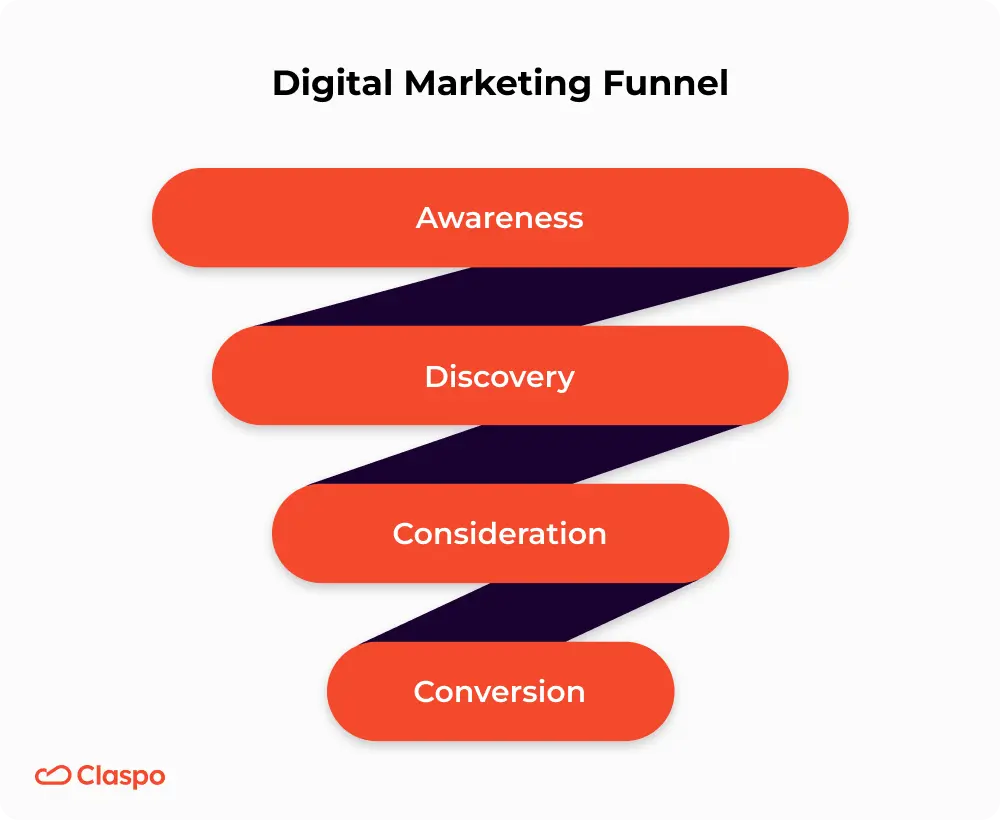
Each stage must be carefully optimized to ensure your lead magnet funnel is effective and generates leads. What is the lead magnet funnel setting up? We’ll provide a step-by-step guide to help you fine-tune the process.
1. Identify Your Target Audience
Before creating a lead magnet, it’s crucial to research and define your target audience. Develop a detailed target persona to identify who you want to attract with your lead magnet. This will help you tailor your lead magnet to meet the person’s specific needs and interests. Persona-based content boosts customer engagement by six times when targeting cold leads.
Even if your lead magnet is valuable and high-quality, if it doesn’t align with your potential customers' goals and pain points, they won’t engage with it. Here are a few ways to identify what your potential customers want:
- Leverage internal company resources for research. If you have sales, customer success or a support team, ask them to share insights on the most common problems and goals reported by clients. This data can help you tailor your lead magnet to address these specific issues.
- Explore the testimonial pages of your competitors to understand their customers' concerns, gaps, and excitements. Before doing this, make sure to review feedback on your own business as well. For example, popular resources for SaaS and martech products are G2, Capterra, Trustpilot, Software Advice, Product Hunt, etc.
- Research what your target audience is discussing in forums, social media groups, and other communities. People often share their needs, problems, and challenges within specific industries. For example, on Reddit, you can find discussions about issues and tasks from both industry specialists and everyday consumers.
- Survey your existing customers. You can do this through direct channels like email or by leveraging site traffic with a survey widget. For example, with Claspo, you can easily create a survey using the drag-and-drop builder, customize it to match your site’s design, set the necessary display rules, and seamlessly transfer the data to your CRM or other systems.
You may have multiple buyer personas, but each lead magnet should target only one. Gradually create a lead magnet for each.
2. Create a Killer Lead Magnet
Once you've identified your target audience, the next step is to choose the lead magnet format. This decision should be based on your company's business scope and the preferences of your potential customers.
Here are some of the most common types of lead magnets:
- Ebooks: in 2023, guidebooks and ebooks had the highest conversion rate for text-based lead magnets, at 83.60%.
- Whitepapers: 91% of IT buyers considered white papers the second-most effective content type in the buying process.
- Case studies: 61% of B2B marketers viewed lead magnets offering case studies as "moderately successful."
- Free courses: 64% of marketers find lead magnets featuring courses to be effective.
- Webinars: 44% of respondents consider webinars among the most effective lead magnets.
- Exclusive discounts: lead magnets with monetary value, such as discounts, are reported to have the highest conversion rates.
This is only a partial list, as a lead magnet can be anything based on the needs of your potential leads. For example, consider the “Free Product + Shipping” model, where the lead receives a valuable product, such as a book, but pays for shipping.
Researching your customers will help you choose the right type.
What qualities should an effective lead magnet have? It is more than just an incentive for potential customers; it must adhere to key principles:
- The lead magnet should solve a problem by offering tangible value, such as practical recommendations or reduced pricing.
- It needs to be relevant, addressing an actual issue or interest of the target audience to encourage signups.
- A strong call to action (CTA) is essential. It guides readers to take the next step, whether downloading a resource, joining a webinar, or subscribing to a newsletter.
- Lead magnets should yield measurable outcomes, like increased leads or sales, demonstrating their effectiveness.
- It should address a specific audience segment, customizing content to make it more engaging and relevant.
- High-quality design and content are crucial to building trust and enhancing your brand’s perception.
- A good lead magnet should be accessible, allowing for immediate download or online access upon providing contact information.
- It should deliver clear benefits, offering actionable advice and promises of specific, easily achievable advantages.
Here are some tips to make your lead magnet successful:
- Keep it simple: a complex lead magnet can repel prospects. Make it concise and packed with value. Nearly 60% of marketers reported that their short-form written content, such as newsletters, checklists, and e-book samples, achieved the highest conversion rates.
- Utilize social proof and testimonials. When integrated into a lead magnet strategy, social proof notifications can increase conversions by up to 17%.
Once you have created a valuable lead magnet, it's time to develop a landing page for it to drive traffic from various sources.
3. Design a High-Converting Landing Page
Designing a high-converting landing page requires a strategic approach to ensure maximum engagement and conversions.
Start with a clear and compelling headline that immediately communicates the value of your offer. According to Copyblogger, 8 out of 10 people will read a headline, but only 2 out of 10 will continue to read the rest.
Here's how attention-grabbing the Copyblogger headline is:

Use concise and persuasive copy to highlight the benefits of your lead magnet, incorporating social proof such as testimonials or case studies to build trust. Include a visually appealing design with eye-catching graphics and a clean layout to enhance readability.
To encourage site visitors to sign up and use the lead magnet, the company featured the names of renowned experts in the field and made the form visually appealing:

Website performance is all about how quickly and smoothly your site runs. It impacts user satisfaction and search engine rankings. Fast load times and a great user experience keep visitors happy and improve your search visibility.
Plus, with 63% of online traffic coming from mobile devices, ensuring your site looks and works great on smartphones and tablets is crucial. Don’t miss out on this opportunity to connect with your audience wherever they are.
Here’s one more tip: consider allowing partial access to your lead magnet without requiring a signup. For example, if you offer an ebook, display the first section on the landing page.
This approach might reduce the number of leads since some users may preview the content and choose not to share their email for full access. However, it will attract genuinely interested leads who are more likely to engage with your offer.
4. Set Up Your Lead Magnet Form
Once your landing page design and text are finalized, it's time to set up the lead capture form. This form can be either inline directly on the page or presented as a lead capture popup.
Think carefully about the data you want to collect, but remember, people are more likely to complete forms with fewer fields. For instance, popups with only two fields have a conversion rate of 3.31%, whereas those with three fields see a drop to 1.08%.
Ensure that the form integrates seamlessly with the design of your landing page. Claspo offers a library of 700+ templates that you can fully customize to match your website appearance.

You don’t need to be a professional designer — the intuitive drag-and-drop builder provides numerous tools to help you create the perfect form.
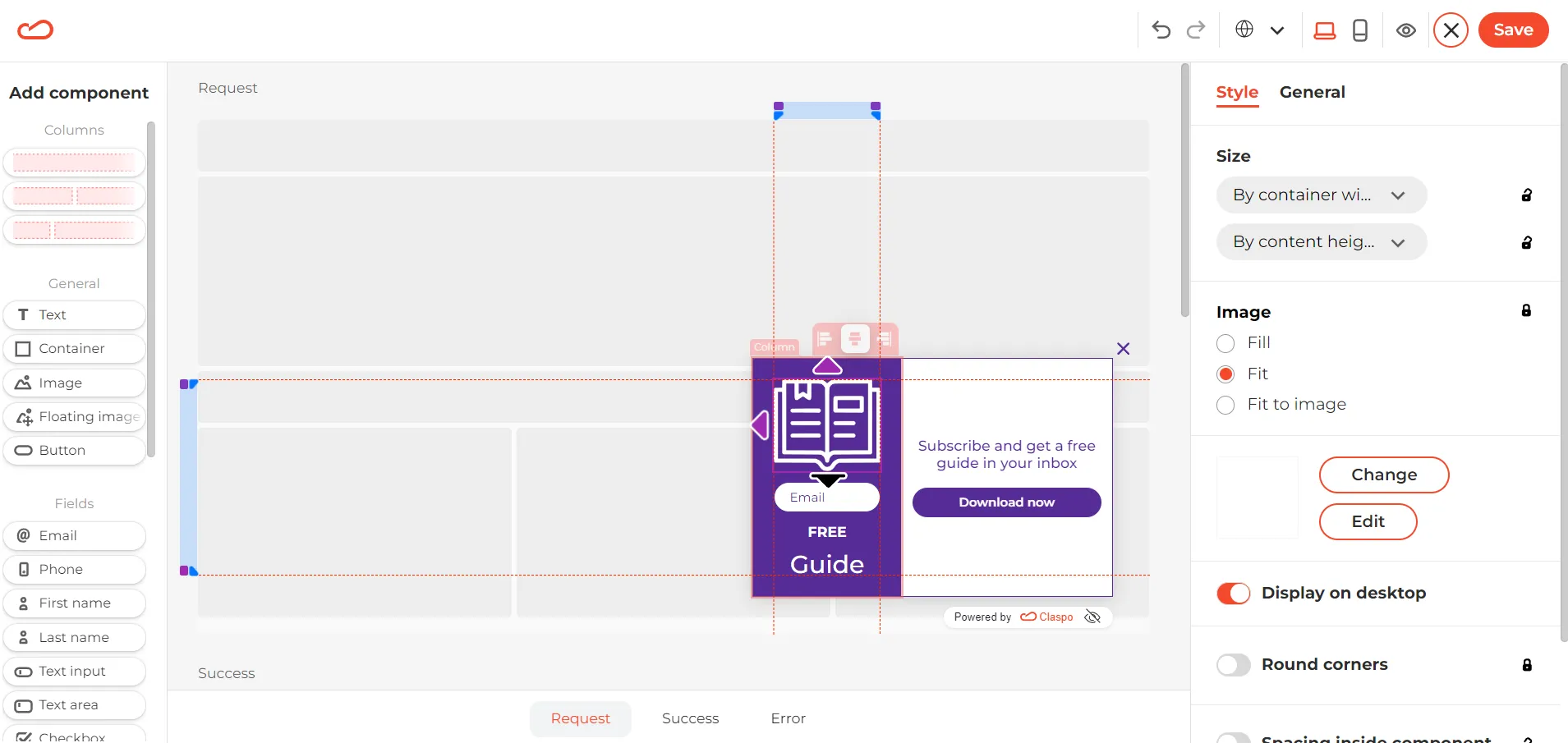
Don't forget that you can draw attention to the form using elements like:
- Images: they can boost popup click-through rates by more than 25%.
- Videos: 87% of marketers report that video has significantly contributed to lead generation.
- Countdown timers: research shows countdown timers boost popup conversions on average from 3.7% to 8.07%.
The Claspo builder includes all these elements and more. For instance, you can display multiple images on one form using the web slider template:
You can place lead magnet forms on a dedicated landing page or on various pages throughout your website. In this case, customize the display rules for your lead forms.
For instance, in Claspo, you can adjust settings such as display frequency, start and end times, device types, target countries and more. Detailed display conditions give you the power to target your audience precisely. For instance, you can set up the widget to appear only for new visitors or just for people from a specific country or region.
Plus, you can make the widget pop up based on certain triggers. For example, after a visitor has spent a certain amount of time on your site, viewed a specific number of pages, or scrolled through a percentage of a page. Moreover, UTM targeting lets you display the widget to users from specific sources or pages.

It’s crucial to configure these forms correctly to avoid overwhelming visitors, especially if you use different types, such as inline forms, popups, and floating web page widgets.
Claspo's silent interval and annoyance safeguard features ensure that forms are displayed to minimize irritation and maximize engagement. These settings ensure that your widgets do not appear simultaneously or overlap.
Design, display rules, and timing settings are crucial for your lead magnet's success.
5. Integrate with Your Email Marketing Platform
Once you've created your lead magnet and online subscription form, it's crucial to ensure the resource will also handle the collected leads.
If you use a CRM, CDP, or ESP for customer communication, you should integrate your form with these platforms.
It's not enough to merely collect and store data; you need to leverage it effectively for future engagement and communication. Integration allows you to seamlessly transfer and utilize lead information, enhancing your ability to nurture leads and drive conversions.
Once you've decided which platform to integrate your lead form with, you must go through the integration process. Сlaspo popup builder integrates seamlessly with popular ESP, CRM and CMS platforms. The integration process is simple and takes just a few clicks with the help of step-by-step guides. What’s more, you can embed the Claspo plugin into your CMS, CRM, CDP, or ESP.
When a user subscribes via a lead form, it's important to send them a timely welcome email. With the help of your provider, create and set up an automated follow-up message sequence. There, you can thank the lead for signing up, deliver the lead magnet, and set expectations for future emails. Your job is not just to capture a lead but also to guide them further down the sales funnel.
6. Promote Your Lead Magnet
Advertise your lead magnet using a variety of tools and platforms to attract traffic. This will reduce the Cost per Lead.
For example, the average CPL for B2B SaaS is $237 (according to First Page Sage for 2024). However, the average CPL for LinkedIn ads is $98 (TheB2BHouse data), and for Facebook ads, it’s $102 (Metadata 2023 B2B Paid Social Benchmark Report).
Share your lead magnet on all your social media channels. Create engaging posts, stories, and ads, and partner with influencers to reach a broader audience.
Consider the specifics of your niche and identify where your potential leads spend the most time. For example, LinkedIn outperforms other social media platforms regarding B2B lead generation.
Here’s how digital learning platform Learnx promotes its ebook on LinkedIn:

Mention your lead magnet during webinars or podcast appearances. Provide listeners with a link to visit a dedicated landing or to download or sign up for your lead magnet.
During podcast episodes, health and fitness company Mind Pump directs listeners to their guides on their website’s "Free Resources" page. These guides require filling out a form with a name and email. This converts listeners into leads, whom they then target with email marketing to sell their full workout programs, effectively generating significant sales.

Invest in paid advertising campaigns on Google Ads, Facebook Ads, etc., to promote your lead magnet to a targeted audience. PPC traffic converts 50% better than organic site visitors.
For example, AppFast advertises a 50% discount on the first order on Facebook. When a user clicks on the ad, they go to a landing page with a description of the offer. There, they are greeted by two widgets: one in the form of a floating bar, followed by a popup displayed after a few seconds.
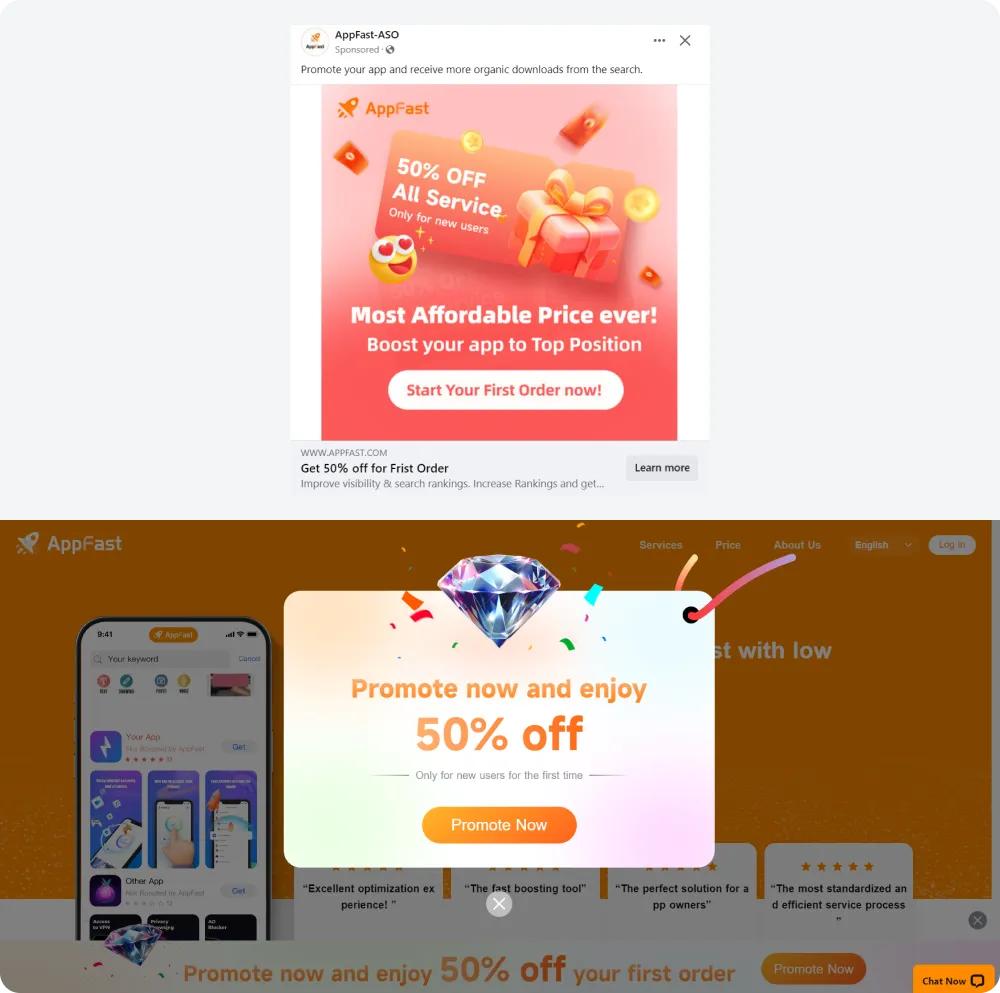
7. Track and Optimize Your Funnel
Tracking metrics for your lead magnet is crucial for gauging its performance and spotting areas for improvement. By diving into data like conversion and click-through rates, you can see how well your lead magnet draws in and engages your audience.
This insight helps pinpoint weak spots, such as a high bounce rate, suggesting your content might need a boost. According to a Harvard Business Review study, companies that effectively use KPIs are twice as likely to achieve their strategic goals compared to those that do not.
Here are the main metrics to keep your eyes on:
- The conversion rate indicates how effectively your lead magnet turns visitors into leads, with high rates signifying compelling offers.
- CTR measures the attractiveness of your call-to-action, reflecting audience interest.
- Bounce rate reveals how engaging your landing page is; a high rate suggests content misalignment.
- Lead quality assesses the potential value of leads, ensuring they match your target audience.
- Monitoring cost per lead (CPL) helps manage financial efficiency, while time on page indicates engagement levels.
In Claspo, you can easily track the effectiveness of your lead magnet form. Real-time data on views, clicks, and subscriptions are displayed separately on user-friendly graphs for desktop and mobile devices. Additionally, you can set up performance data transfer to Google Analytics for more comprehensive insights.
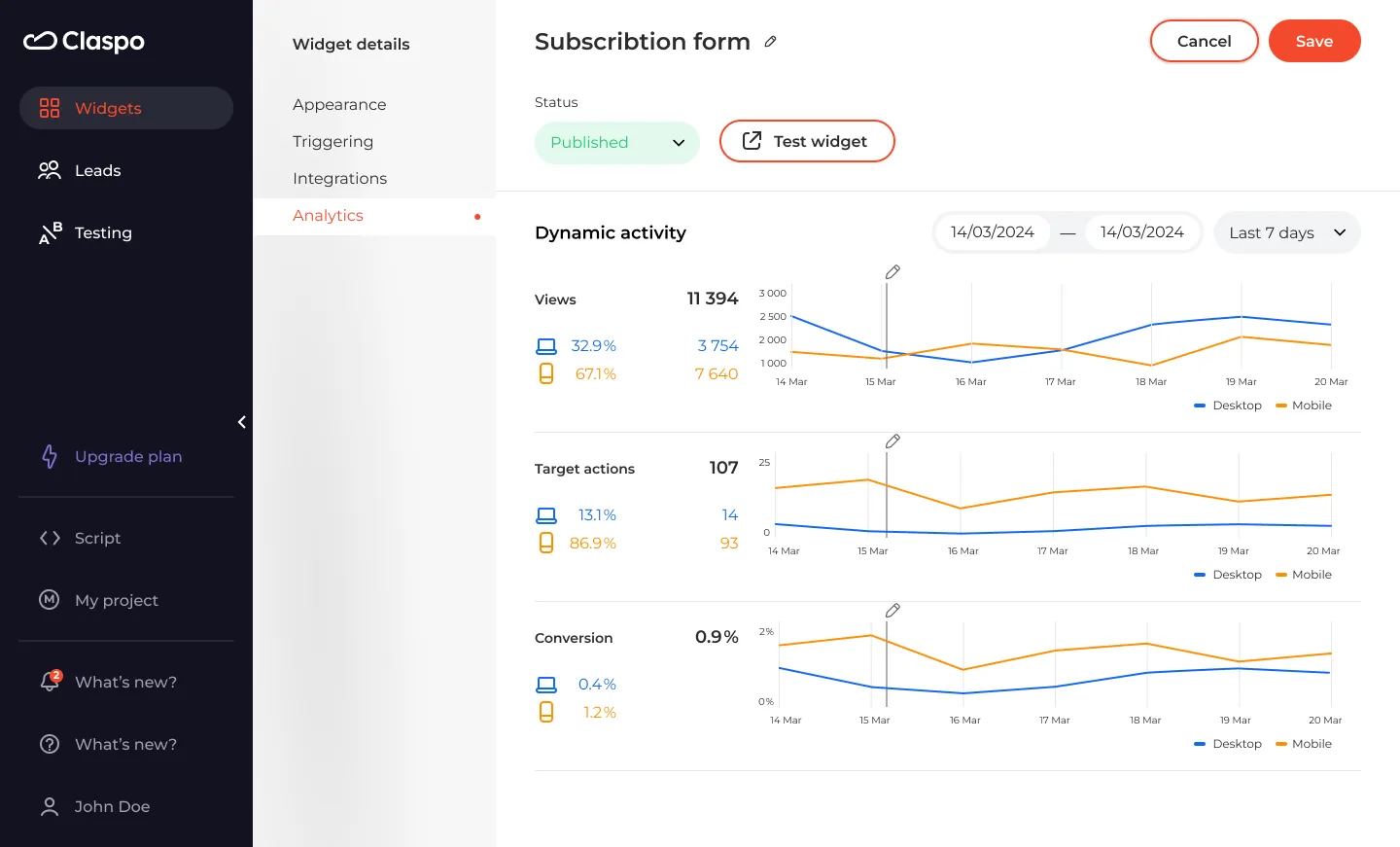
What’s more, Claspo allows you to A/B test two or more widgets. This feature enables you to compare the performance of different versions, helping you identify which form design, copy, or layout generates the highest conversion rates.
Except for the lead form, you can test:
- Lead magnet: content format, design and visuals, value proposition.
- Landing page content: headlines, page layout, CTA buttons.
- Email welcome campaigns: subject lines, email content, frequency.
Lead Magnet Funnel Examples
Let's explore actual examples of how companies effectively use lead magnets to attract quality leads.
Bay Leaf Digital
Bay Leaf Digital is a SaaS marketing agency that has created an ebook lead magnet featuring proven marketing strategies. To promote it, they designed a popup signup form that appears when visitors navigate to their blog and open an article.
Timing is crucial for the success of this lead magnet. Instead of displaying the form immediately upon site entry, they wait until the visitor engages with the blog content. This approach ensures that potential leads are already somewhat interested, increasing the likelihood of conversions.

When visitors click the popup button, they are directed to a dedicated landing page. This page clearly and systematically outlines the lead magnet's offerings. Additionally, it leverages social proof by showcasing the agency's achievements, enhancing credibility and encouraging signups.
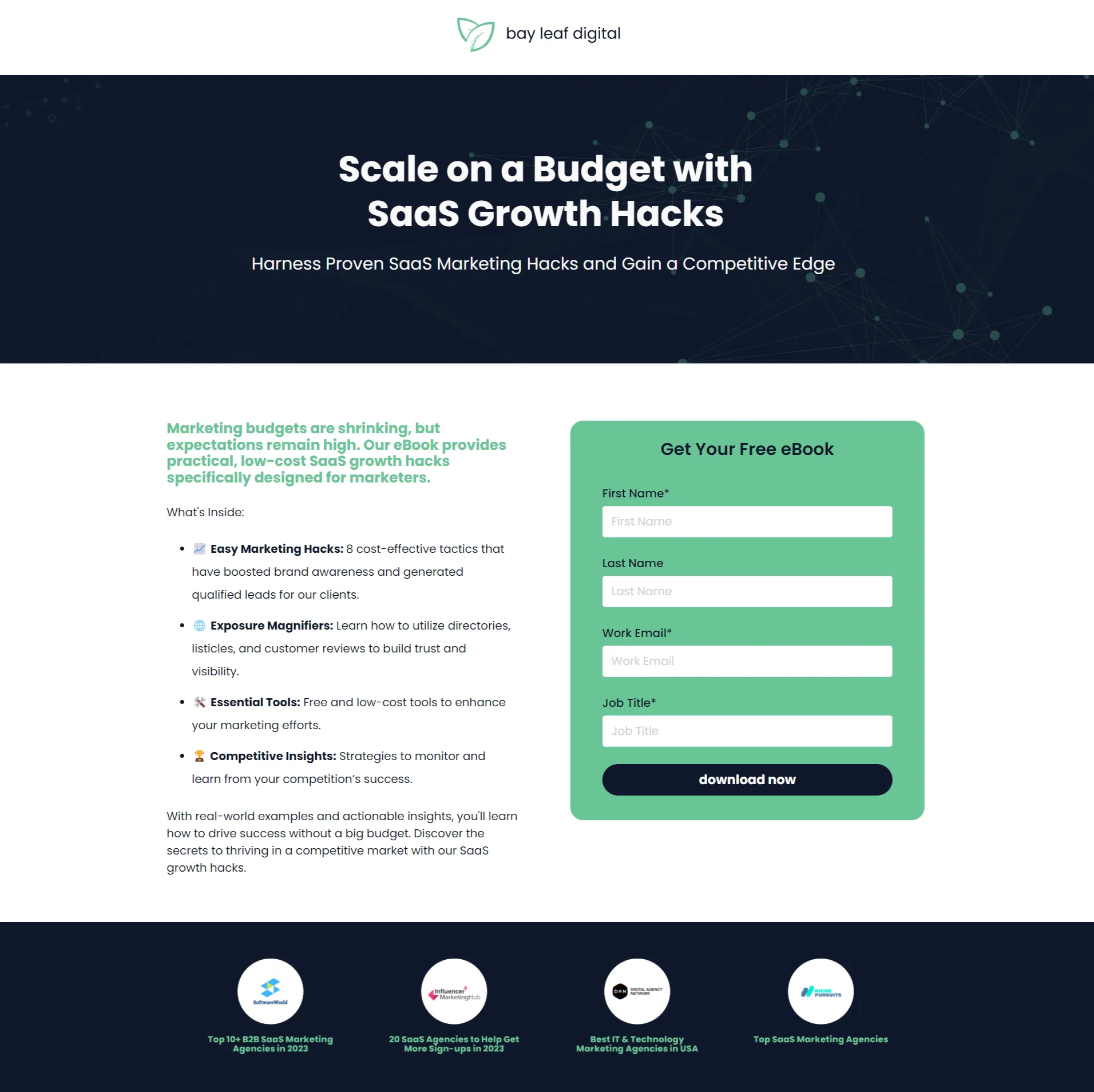
Designrr
Designrr is a software application. They developed a funnel featuring a lead magnet: a 7-day free Pro plan trial followed by a discounted annual subscription offer. The popup presenting this offer appears on the homepage after a few seconds, giving visitors ample time to explore the site without feeling interrupted by the popup.
A clear structure, a prominent CTA, and an emphasis on financial benefits encourage visitors to click through and discover more about the offer.
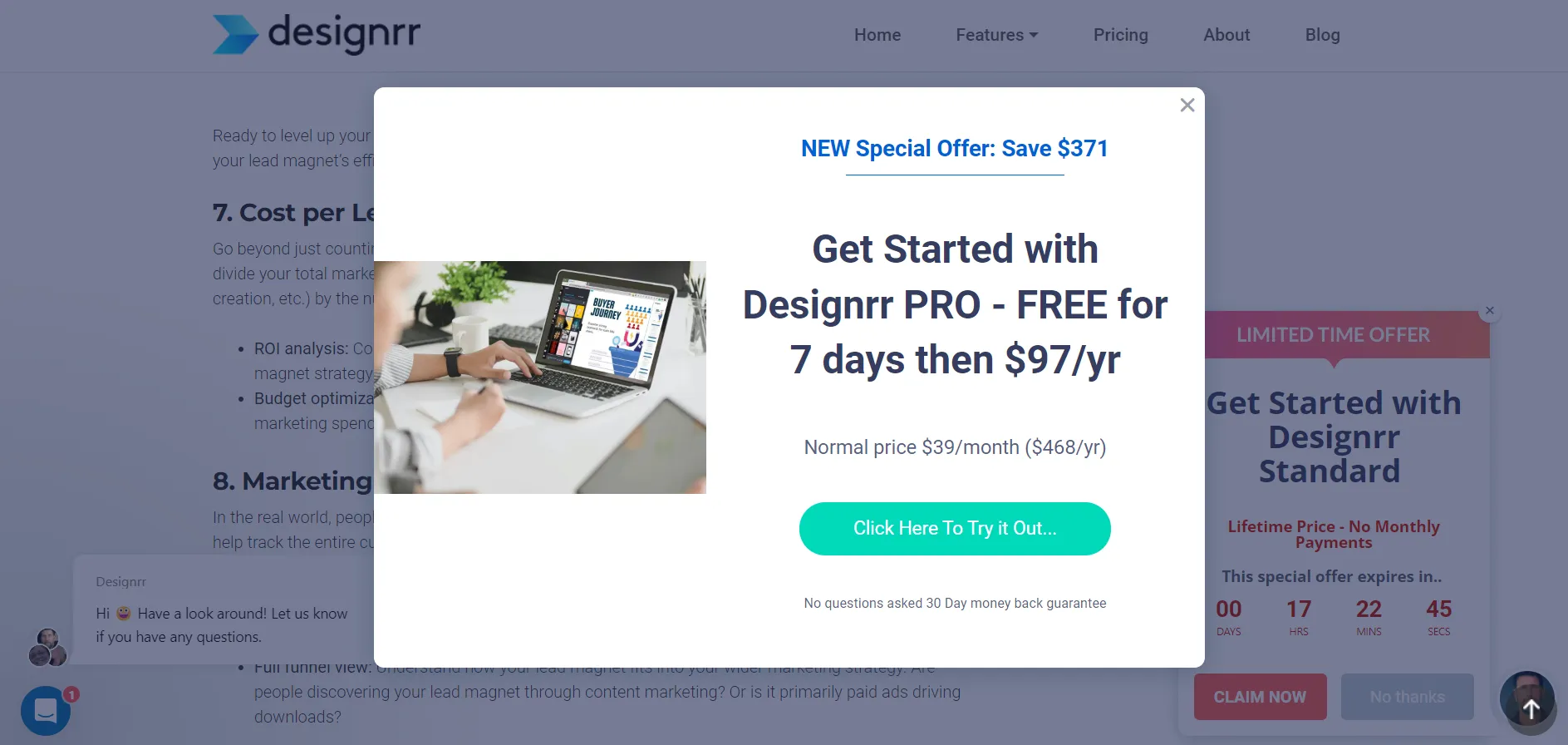
Sprout Social
Sprout Social is a social media management platform. It hosts webinars to keep marketers updated on the latest social media trends and best practices. Its website displays a lead form with just one field to fill out.
Sprout Social’s webinars cover timely topics that resonate with the marketing community. For example, they explore how AI can enhance social media marketing, a trending subject that encourages engaging discussions and expert perspectives.

Lead Magnet Funnel Templates
We’ve gathered examples of lead forms to inspire you to create an effective and compelling lead magnet:
- Invite to a webinar
- Offer participation in a giveaway
- Suggest a whitepaper
- Incentivise with a workshop
- Include the ebook and templates
Conclusion
We’ve broken down the lead magnet funnel concept, showing you how to build, optimize, and leverage it with real-world lead magnet funnel examples.
By getting to know your audience, crafting a valuable lead magnet, designing a standout landing page, setting up effective forms, and integrating with your email platform, you can supercharge your growth and engagement.
Remember to promote your lead magnet on different platforms and monitor its performance to keep improving.
Dive into Claspo popup builder tools and resources to create a powerful lead magnet form. Sign up for our free plan to experience the convenience of our service. Start collecting high-quality leads today and see the difference for yourself!













